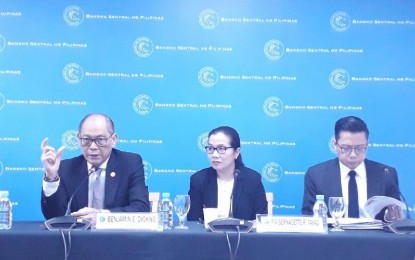
COVID-19. Bangko Sentral ng Pilipinas (BSP) Governor Benjamin Diokno (leftmost) explains the central bank's initial assessment on the impact of Covid-19 on the economy during a briefing on Thursday (Feb. 27, 2020). He remains confident of 6 percent-level economic growth this year, citing the epidemic still has little impact to the Philippine economy. Also in photo are BSP Managing Director Pia Roman-Tayag and BSP Department of Economic Research Director Dennis Lapid. (Photo by Joann Villanueva)
MANILA -- Bangko Sentral ng Pilipinas (BSP) Governor Benjamin Diokno is open for the implementation of additional key rate cuts on banks’ reserve requirements if the situation calls for it amid the impact of the coronavirus disease 2019 (Covid-19).
In a briefing Thursday, Diokno said he is committed to slash the central bank’s key policy rates by 50 basis points this year on back of expectations of within-target inflation rate.
Monetary officials slashed by 25 basis points the BSP’s key policy rates during the rate-setting meet of the policy-making Monetary Board (MB) last February 6.
To date, the BSP’s overnight reverse repurchase (RRP) rate is 3.75 percent, the overnight lending rate is 4.25 percent, and the overnight deposit rate is 3.25 percent.
Last year, banks’ reserve requirement ratio (RRR) was reduced by as much as 400 basis points.
Diokno vowed to bring this to single-digit by the end of his term in 2023.
To date, RRR of universal and commercial banks (U/KBs) is 14 percent, thrift banks (TBs) 4 percent, and rural banks (RBs), 3 percent.
“We have a lot of monetary space and fiscal space so if things deteriorate much beyond what we have originally forecasted, we might consider additional cuts in reserve requirement or in the interest rate or policy rate. But when that will happen, of course, that will depend on our assessment of the situation and the conditions,” he said.
BSP forecasts inflation this year to average at 3 percent, the mid-point of the government’s 2 to 4-percent target.
Diokno said he has instructed BSP Deputy Governor Francisco Dakila Jr. to revisit the inflation estimates but the exercise is not yet finished.
He said although Covid-19 is less fatal than severe acute respiratory syndrome (SARS), which also originated from China in 2002, the latest virus has more reach as shown by the number of cases in several countries.
“The center of gravity here is China. And China during the SARS incidence is much different from China now so the global link is also important. China now accounts for, I think, at least 30 percent of global growth if not higher,” he added.
Diokno reiterated their initial assessment of a “V-shape” recovery if the impact of the virus will only be for one quarter, which will hit domestic growth by about 0.2 percent.
If the epidemic will last for two quarters, the impact on growth is projected to be 0.4 percent with the average impact placed at 0.3 percent for the first semester this year.
“But I think, now, the feeling is there’s not going be a V-shape recovery. It could be an elongated u-shape,” he added. (PNA)
